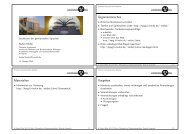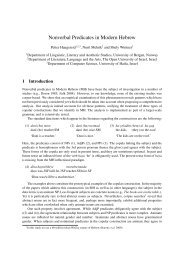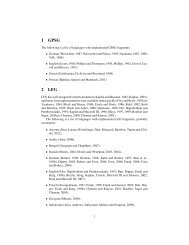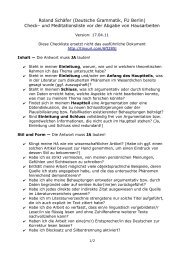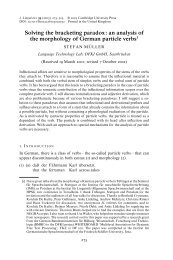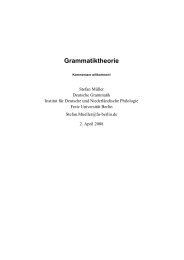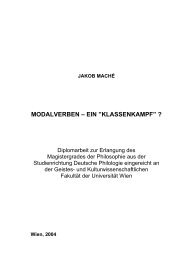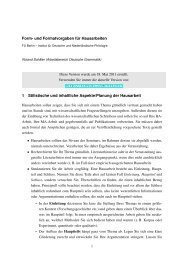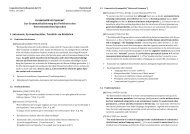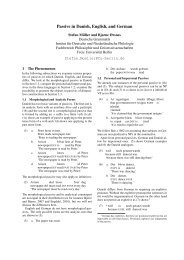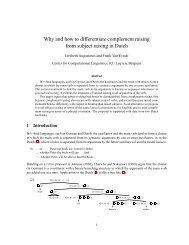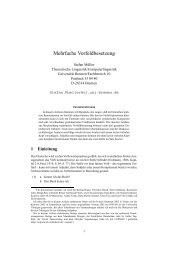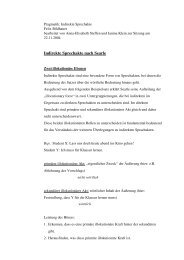- Page 1:
Danish in Head-Driven Phrase Struct
- Page 4 and 5:
e Project is book is part of a larg
- Page 6 and 7:
has object agreement. Since German
- Page 8 and 9:
Danish Danish is a North-Germanic l
- Page 10 and 11:
the World Wide Web are used. Our ex
- Page 12 and 13:
A Note on the Way this Book is Publ
- Page 14 and 15:
Contents . e Analysis . . . . . . .
- Page 16 and 17:
Contents .. Passivization of Result
- Page 18 and 19:
Contents . Conclusion . . . . . . .
- Page 20 and 21:
A Brief Introduction to HPSG four c
- Page 22 and 23:
A Brief Introduction to HPSG exampl
- Page 24 and 25:
A Brief Introduction to HPSG . NP.
- Page 26 and 27:
A Brief Introduction to HPSG e lis
- Page 28 and 29:
A Brief Introduction to HPSG e head
- Page 30 and 31:
A Brief Introduction to HPSG h h:ev
- Page 32 and 33:
A Brief Introduction to HPSG V[ ⟨
- Page 34 and 35:
A Brief Introduction to HPSG c. CAU
- Page 36 and 37:
A Brief Introduction to HPSG () Lex
- Page 39 and 40:
A topological model of the Danish c
- Page 41 and 42:
. e topological model makes lile se
- Page 43 and 44:
. V -clauses and V -clauses b. fo
- Page 45 and 46:
. V -clauses and V -clauses () ()
- Page 47 and 48:
. A topological model a Prefield an
- Page 49 and 50:
. A topological model Prefield T/C
- Page 51 and 52:
. A topological model aer the adver
- Page 53 and 54:
. A topological model If the consti
- Page 55 and 56:
. A topological model e adverb deri
- Page 57 and 58:
. A topological model Finally, inhe
- Page 59 and 60:
. Inadequacies of the topological m
- Page 61 and 62:
. Inadequacies of the topological m
- Page 63 and 64:
. Other Languages Prefield T/C Sent
- Page 66 and 67:
Object Shi and Negation Shi In Chap
- Page 68 and 69:
. e Phenomenon In a similar vein an
- Page 70 and 71:
. e Phenomenon e exact restrictions
- Page 72 and 73:
. e Phenomenon () Jeg sover [her] i
- Page 74 and 75:
. e Phenomenon Also it is impossibl
- Page 76 and 77:
. e Phenomenon () a. at han ikke [f
- Page 78 and 79:
. e Phenomenon () a. ? [Foræret] h
- Page 80 and 81: . e Phenomenon For these reasons we
- Page 82 and 83: . e Phenomenon () a. Mærkeligt ogs
- Page 84 and 85: . e Phenomenon elements like finite
- Page 86 and 87: . e Phenomenon () a. fordi vi så s
- Page 88 and 89: . e Phenomenon .. Parasitic Gaps an
- Page 90 and 91: . e Analysis () Mapping from to va
- Page 92 and 93: . e Analysis S NP S/NP V⟨ S//VP
- Page 94 and 95: . e Analysis b. give with shied ind
- Page 96 and 97: . e Analysis S NP S/NP V⟨ S//VP
- Page 98 and 99: . e Analysis .. Shiing and Preposit
- Page 100 and 101: . e Analysis S VP[ ⟨ 1 , 2 ⟩] S
- Page 102 and 103: . e Analysis ⎡ [ ] ⎤ pass ver
- Page 104 and 105: . e Analysis S NP S/NP V⟨ S//V
- Page 106 and 107: . e Analysis S VP[ ⟨ 1 , 2 ⟩] S
- Page 108 and 109: . Alternatives b. Kender Peter [hen
- Page 110 and 111: . Alternatives () Hun kender [ham]
- Page 112 and 113: . Alternatives CP C IP NP VP NP VP
- Page 114 and 115: . Alternatives movement analysis on
- Page 116 and 117: . Alternatives () a. Jeg har I have
- Page 118 and 119: . Alternatives CP[ ⟨ m:at, n:Jens
- Page 120 and 121: . Alternatives within the VP (V ).
- Page 122: . Conclusion to the list and then
- Page 125 and 126: Copula Constructions c. Sylvia is [
- Page 127 and 128: Copula Constructions like Danish: D
- Page 129: Copula Constructions b. * at klog e
- Page 133 and 134: Copula Constructions . e Analysis .
- Page 135 and 136: Copula Constructions () ⎡ | ⎡
- Page 137 and 138: Copula Constructions Sema (Predica
- Page 139 and 140: . Copula Constructions Vs1[ ⟨
- Page 141 and 142: Copula Constructions e noun mayor i
- Page 143 and 144: Copula Constructions . V[ . ⟨⟩
- Page 145 and 146: Copula Constructions adjective phra
- Page 147 and 148: Copula Constructions V s [ ⟨ .
- Page 149 and 150: Copula Constructions treat specific
- Page 151 and 152: Copula Constructions ese nouns are
- Page 153 and 154: Copula Constructions V s[ ⟨ ⟩,
- Page 155 and 156: Copula Constructions e Fregean way
- Page 157 and 158: Copula Constructions result of comb
- Page 159 and 160: Copula Constructions accounts for t
- Page 161 and 162: Passive e discussion of passive in
- Page 163 and 164: . e Phenomenon f. Teksten læses fr
- Page 165 and 166: . e Phenomenon verbs select sein (
- Page 167 and 168: . e Phenomenon It is important to n
- Page 169 and 170: . e Phenomenon verb to have an accu
- Page 171 and 172: . e Phenomenon b. at [her] [snakkes
- Page 173 and 174: . e Phenomenon () Der hævdes at bo
- Page 175 and 176: . e Phenomenon Example () provides
- Page 177 and 178: . e Phenomenon () ?? Bilen blev ski
- Page 179 and 180: . e Phenomenon () a. Han har arbejd
- Page 181 and 182:
. e Phenomenon morphological passiv
- Page 183 and 184:
. e Phenomenon is primarily formed
- Page 185 and 186:
. e Phenomenon To sum up: Semantic
- Page 187 and 188:
. e Phenomenon We will only discuss
- Page 189 and 190:
. e Phenomenon In (), the participl
- Page 191 and 192:
. e Phenomenon a reading, where the
- Page 193 and 194:
. e Phenomenon () dig i , _ i der l
- Page 195 and 196:
. e Phenomenon So far we have shown
- Page 197 and 198:
. e Phenomenon krijgen-passives).
- Page 199 and 200:
. e Phenomenon (‘to present’) c
- Page 201 and 202:
. e Analysis () Lexical information
- Page 203 and 204:
. e Analysis e subject (NP[str] i )
- Page 205 and 206:
. e Analysis b. læset and læses:
- Page 207 and 208:
. e Analysis list of the matrix ve
- Page 209 and 210:
. e Analysis .. Passivization of Di
- Page 211 and 212:
. e Analysis . S. VP[ ⟨ . 1 , 2
- Page 213 and 214:
. e Analysis the marker would mark
- Page 215 and 216:
. Other Languages . S. 1 NP[nom] .
- Page 217 and 218:
. Other Languages .. e Passive Auxi
- Page 219 and 220:
. Other Languages () a. giv: ⟨ N
- Page 221 and 222:
. Other Languages list of the embe
- Page 223 and 224:
. Alternatives As (c) shows the sub
- Page 225:
. Conclusion ... e Status of Interm
- Page 228 and 229:
A List of Phrases Covered/Rejected
- Page 230 and 231:
A List of Phrases Covered/Rejected
- Page 232 and 233:
A List of Phrases Covered/Rejected
- Page 234 and 235:
A List of Phrases Covered/Rejected
- Page 236 and 237:
A List of Phrases Covered/Rejected
- Page 238 and 239:
A List of Phrases Covered/Rejected
- Page 240 and 241:
A List of Phrases Covered/Rejected
- Page 242 and 243:
A List of Phrases Covered/Rejected
- Page 244 and 245:
A List of Phrases Covered/Rejected
- Page 246 and 247:
A List of Phrases Covered/Rejected
- Page 248 and 249:
A List of Phrases Covered/Rejected
- Page 250 and 251:
A List of Phrases Covered/Rejected
- Page 252 and 253:
Bibliography Andersen, Mee Skovgaar
- Page 254 and 255:
Bibliography Bjerre, Tavs. . Object
- Page 256 and 257:
Bibliography Bu, Miriam & Tracy Hol
- Page 258 and 259:
Bibliography Davis, Anthony R. . Le
- Page 260 and 261:
Bibliography Engelberg, Stefan. . K
- Page 262 and 263:
Bibliography Fortmann, Christian. .
- Page 264 and 265:
Bibliography Haegeman, Liliane. . N
- Page 266 and 267:
Bibliography Hoeksema, Jack. . Nega
- Page 268 and 269:
Bibliography Jäger, Gerhard & Rein
- Page 270 and 271:
Bibliography Keller, Frank. . Towar
- Page 272 and 273:
Bibliography available as DFKI Rese
- Page 274 and 275:
Bibliography Lødrup, Helge. . Look
- Page 276 and 277:
Bibliography Mikkelsen, Line. a. Co
- Page 278 and 279:
Bibliography Müller, Stefan. a. e
- Page 280 and 281:
Bibliography Müller, Stefan & Jann
- Page 282 and 283:
Bibliography Ørsnes, Bjarne. a. Pa
- Page 284 and 285:
Bibliography Pullum, Geoffrey K. .
- Page 286 and 287:
Bibliography Rothstein, Susan D. .
- Page 288 and 289:
Bibliography Simpson, Jane. . Resul
- Page 290 and 291:
Bibliography Vogel, Ralf. . Skandal
- Page 293 and 294:
Index of Names Abbo, Barbara, , Ab
- Page 295 and 296:
Index of Names Hellan, Lars, , , ,
- Page 297 and 298:
Index of Names , , , , , , , , , P
- Page 299 and 300:
Index of Languages Basque, v Dutch,
- Page 301:
Index of Subjects recipient, state



